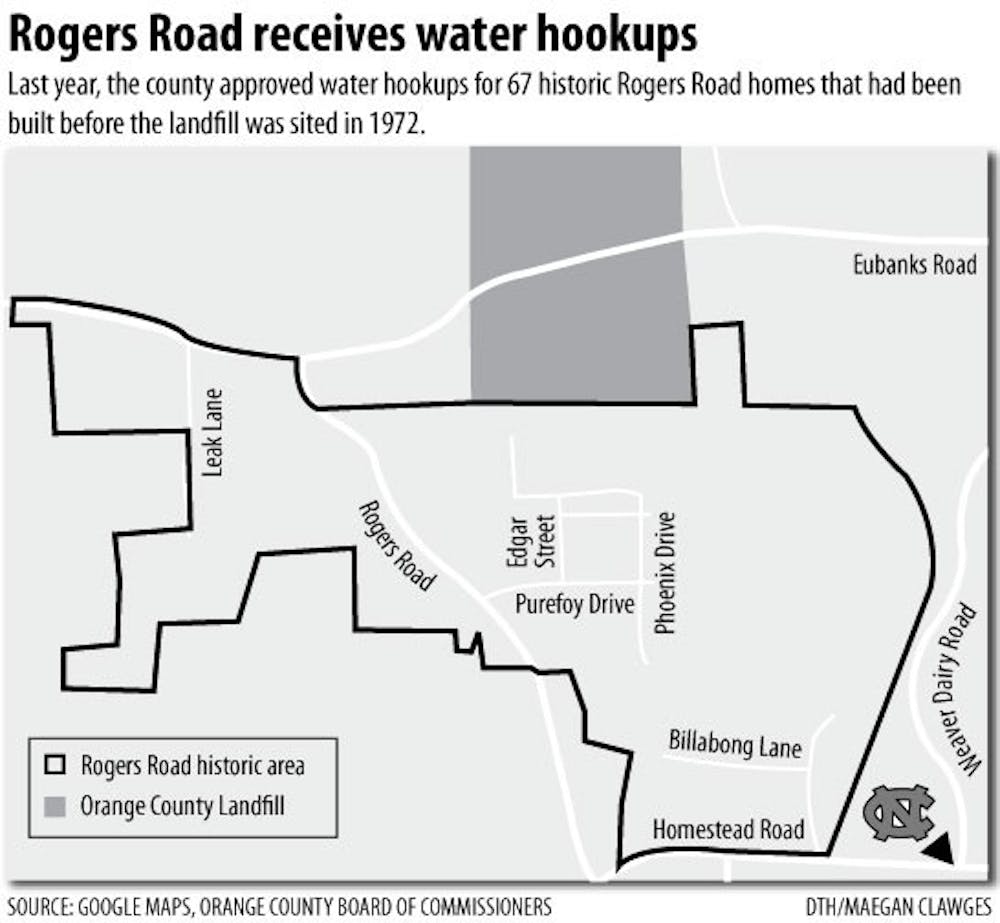He said he is mainly concerned with providing public water and sewage access to people who already lived on Rogers Road when the landfill was created.
“I’m not talking about those folks who chose to move in next to a landfill,” he said.
But McKee said he worries the water and sewage connections will have unintended consequences on the neighborhood.
“You can’t put in these hookups, and then say no to development,” he said. “And where you run sewage and water, it makes it more probable that development will occur.”
Carrboro Mayor Mark Chilton, a long-time advocate for the residents of Rogers Road, said he is also worried about gentrification.
“Real estate development follows sewer lines, so if local governments are building sewer lines in that area, then real estate developers will undoubtedly follow,” he said.
Despite his concern, Chilton said that many residents still want access to municipal water.
“I’ve pointed this issue out to some residents before, but they are steadfast in saying that they are willing to run that risk,” he said.
But Campbell said many near Rogers Road feel officials might be using gentrification as a reason not to pay for the hookups.
“That is part of a general scare tactic to persuade people not to improve and move forward, whether it’s intentionally done or unintentionally,” he said.
Campbell said Rogers Road residents plan to participate in development decisions to prevent gentrification.
“If we allow development to take place, but the development does not enhance the community, that’s when it becomes gentrification, so we try to make sure that doesn’t happen,” he said.
To get the day's news and headlines in your inbox each morning, sign up for our email newsletters.
William Rohe, the director for the UNC Center for Urban and Regional Studies, said he thinks gentrification is unlikely in the Rogers Road neighborhood.
“The idea that property appreciation would, in turn, push up property values and raise the tax rate could force out a marginal amount of homeowners,” Rohe said. “But I don’t see a real threat of gentrification for the immediate Rogers Road community.”
But with the gentrification of the Northside neighborhood fresh on their minds, local officials want to prevent a similar process in Rogers Road.
“In Northside, when students moved into the houses, it justified higher and higher property values, which tends to cause higher property taxes,” Chilton said. “This causes seniors and other people on fixed incomes to feel like they need to sell.”
The water and proposed sewage hookups also present the possibility of higher property values, which could inflate taxes, he said.
“The only difference is that it is not so much about students in Rogers Road, it is more about suburban home buyers who will be paying higher prices over time for houses in new subdivisions in that area,” Chilton said.
“So in Northside, it had more to do with the direction that real-estate developers took in creating more student rental housing in Chapel Hill, and not with water and sewer,” he said.
Chilton said that although the causes for gentrification might be different for the two communities, the effects will be similar, and he worries both neighborhoods will begin to lose their character.
But Nunn said she has already seen Rogers Road lose its vibrancy in the last 40 years due to the effects of the landfill — and she hopes it won’t continue.
The landfill was opened in 1972, and its closure, first promised during the 1980s, has been delayed by the county several times.
Many groups have reached out to help residents, often through programs at the Rogers-Eubanks Community Center.
Freshman Daron Holman, a UNC Bonner Leader who tutors children in math and literacy at the center, said residents deserve services from the county after living next to the landfill for so long.
“I feel like the Rogers Road residents have been cheated,” said Holman, who got involved with Rogers Road because of his interest in environmental justice.
“It is my understanding that when they put the landfill here, they told the community they would provide them with more sewage and parks,” Holman said.
He said he was disappointed with local officials for failing to adhere to the promises they made to Rogers Road residents.
“Right now, the landfill is scheduled to close in 2013, but I’m not sure if they will keep that promise either,” he said.
Freshman Zack Kaplan, who also works at the community center through UNC Bonner Leaders, said he’s seen the negative effects of the landfill firsthand.
“With the landfill being here, it has made the community a lot less vibrant,” Kaplan said. “New families are starting to move here … but the community is not coherent.”
The Board of Orange County Commissioners will consider issues related to the Rogers Road community Tuesday night.
at city@dailytarheel.com.



